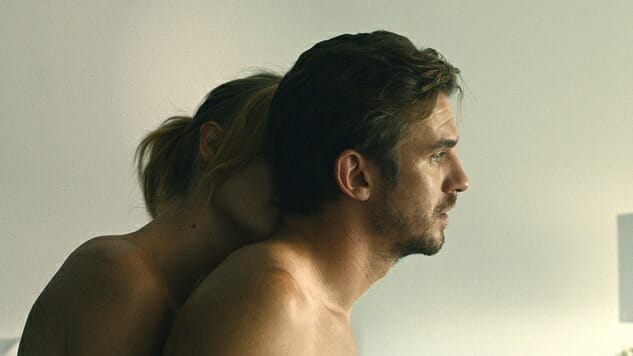The Ticket

When you’ve lived most of your days sans the gift of sight, waking up one morning to suddenly find that you can see would probably throw you into a real anxiety spiral. It might even lead you to question existence as you’ve known it for years and change—maybe even transform you into an insufferable asshole. Such is the stuff of Ido Fluk’s The Ticket, a loosely structured, dreamlike joint about James (Dan Stevens), a blind man who goes from being visually impaired to morally impaired in the passage of one sleep cycle.
James, we’re told, has been blind been since his youth. He’s married to Sam (Malin Akerman), his devoted wife; the film opens on a darkened montage overlaid with hushed sweet nothings passed between them, a sequence whose evocative affection makes up for what it naturally lacks in imagery. They have a young son, Jonah (Skylar Gaertner), and together they share in idyllic domestic bliss, a bubble of tender, normalizing love where James’s impediment scarcely registers as such. Beyond that, we don’t get to know James for very long before he’s struck by a miracle: The tumor squeezing his optic nerves since his boyhood has shrunk sans medical intervention or treatment. All of a sudden, without warning or incident, he can see Sam, see Jonah, see his desk at work, see where he cold calls people for a real estate telemarketing company.
Fluk doesn’t waste any time setting James on a downward spiral spurred by the drudgery of his job: Hooking potential clients over the phone is utter toil, and James rapidly grows discontented by his gig almost as soon as he sees what’s become of him as a professional adult. Able to stomach his routine no longer, James becomes a shark, chewing his way through the corporate ladder on his way to a promotion and to bigger, better things within his career. He becomes the ultimate American go-getter, in other words, which is to say that he becomes a narcissistic prick, abandoning his family in exchange for a fling with his comely co-worker, Jessica (Kerry Bishé), spurning his friend and comrade in blindness, Bob (Oliver Platt), and generally acting like a total douchebag in the grand and longstanding tradition of male entitlement.
To a point, we’re meant to sympathize with James as he lashes out at a world once familiar, now foreign by dint of inexplicable coincidence. No sooner does he regain one of his five senses than he loses his sense, imagining, for example, that Sam only ever married him out of pity, that their matrimony is built on her devious need to control him. Neither Fluk nor The Ticket ever attempt to validate James’s paranoia, of course, because paranoia is all it is, the implication being that profound life changes can knock a person for the loop, even when those changes happen to be positive. (Ostensibly positive, anyways. Bob first feels mild resentment toward James, offense second as James talks at Bob with a deficit of sensitivity, sniping at his blindness as though he’s forgotten that he was blind himself only weeks prior.) They can even turn you into a toxic creep.
-

-

-

-

- Curated Home Page Articles By Test Admin October 21, 2025 | 3:10pm
-

- Curated Home Page Articles By Test Admin October 21, 2025 | 2:57pm
- Urls By Test Admin October 21, 2025 | 2:57pm
- Curated Home Page Articles By Test Admin October 21, 2025 | 2:55pm
-

-

-

-

-

-

-

-

-

-

-

-

-

-

-

-

-

-

-

-

-

-

-

-

-

-

-

-

-

-

-




































